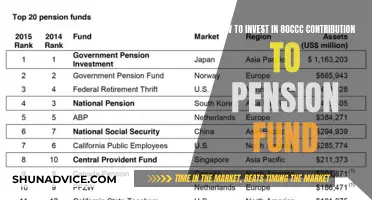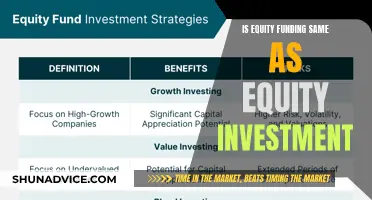
Portfolio Management Services (PMS) are a sophisticated investment avenue for high net-worth individuals seeking higher returns. PMS offers professional financial portfolio management with regular reviews, strong risk management, and flexibility. Unlike mutual funds, PMS focuses on personalized funds and allows investors to have more control over the composition of their portfolios. The minimum investment size for PMS is higher than that of mutual funds, making it inaccessible to some investors. However, PMS typically offers higher returns and is more likely to outperform the markets. To invest in PMS, individuals need to sign several documents, open a designated demat account, and agree to terms and conditions with the PMS provider.
| Characteristics | Values |
|---|---|
| What is PMS? | Portfolio Management Service |
| Who can use PMS? | High net worth individuals (HNIs) seeking higher returns |
| Minimum Investment | Rs. 50 Lakh |
| Where to buy a PMS scheme? | Wealth management firms or distributors |
| How to open a PMS account? | Sign many documents, open a designated demat account |
| PMS vs. MF | PMS is more curated, costlier, and offers higher returns; MF offers a wider variety of stocks and is more transparent |
| PMS Investment Strategy | Diversified portfolio management to reduce risk, active and regular monthly review, quality stock selection |
| PMS Providers | 378 providers, including ICICI Bank, Kotak Bank, HDFC Bank, Axis Bank, Edelweiss, and Orbis |
What You'll Learn

Eligibility criteria for PMS
To be eligible to invest in a Portfolio Management Service (PMS) fund, you must be a high net worth individual (HNI) with a high-risk tolerance. The minimum investment amount for a PMS fund is Rs 50 lakhs, set by the Securities and Exchange Board of India (SEBI) in 2019. This amount was increased from the previous minimum of Rs 25 lakhs to ensure that only investors with a high-risk appetite and the financial capacity to withstand potential losses are eligible for PMS funds.
PMS funds are not suitable for retail investors due to their high-risk nature. The minimum investment amount serves as a safeguard to ensure that only serious investors with a thorough understanding of the risks involved are attracted to PMS funds. This allows fund managers to focus on providing the best service to a smaller, more targeted group of investors.
To open a PMS account, investors must sign multiple documents, some of which are 40-80 pages long. Additionally, a designated demat account is required, where the PMS provider can buy and sell securities on the investor's behalf. The entire account opening process can take several days, and some providers may take up to 30 days to get the PMS account up and running.
It is important to note that PMS funds are not a pooled account like mutual funds. Each client's portfolio is managed separately, depending on their chosen investment strategy. When selecting a PMS fund, investors should carefully consider the provider's investment style, team of fund managers, and terms and conditions regarding profit-sharing and hurdle rates.
Property Funds: A Smart Investment Strategy for Diversification
You may want to see also

Differences between discretionary and non-discretionary PMS
Portfolio Management Services (PMS) are investment portfolios in stocks, fixed income, debt, and other securities, managed by professionals. The two types of PMS—discretionary and non-discretionary—are differentiated by the level of control the client has in decision-making and execution.
In discretionary PMS, the fund manager has complete control over decision-making and execution. The client does not have any say in the investment decisions, and the fund manager acts independently, investing at their discretion. The fund manager manages the funds of each investor separately, and the choice of investment and timing rests solely with them. Discretionary PMS is often used by high-net-worth individuals (HNIs) and institutional investors, with minimum capital requirements starting at $250,000.
On the other hand, non-discretionary PMS involves the client at every step of portfolio management. The fund manager makes investment suggestions, but the decisions on timing and choice of investment are made by the client. The fund manager then executes the trade based on the client's confirmation. Non-discretionary PMS gives the client greater control over their portfolio and the opportunity to question the decisions of the investment manager. However, it can result in missed opportunities due to the time taken to obtain client consent for each trade.
The choice between discretionary and non-discretionary PMS depends on the client's preference, the time they can dedicate to understanding strategies, and their level of involvement in decision-making. Discretionary PMS offers the benefit of outsourcing investment management, while non-discretionary PMS allows the client to remain actively involved in trade decisions.
To invest in a PMS, investors need to open a designated demat account and sign several documents, including a power-of-attorney (POA) agreement. The process can be lengthy and involve a significant amount of paperwork. It is important for investors to carefully consider their risk appetite, investment goals, and the level of involvement they want to have in managing their portfolio when deciding between discretionary and non-discretionary PMS.
Unlocking Absolute Return Funds: Powering Your Investment Portfolio
You may want to see also

Benefits of PMS over mutual funds
Portfolio Management Services (PMS) and Mutual Funds (MF) are both guided investment tools that can help investors buy stocks in the same general market. However, they have very different approaches. Here are some benefits of PMS over MF:
Customised Portfolios
PMS focuses on personalised funds. Managers adopt a collaborative strategy, creating portfolios independently and focusing on each client. PMS portfolios are tailored to the investor's taste and goals, allowing them to have more control over the composition of their portfolios than with MFs.
Higher Returns
PMS is a high-risk, high-reward investment option. While it attracts higher fees and taxes, PMS offers greater returns than MFs. PMS funds are more likely to outperform the markets and get better returns.
Flexibility
PMS investments are more flexible when it comes to investment. The fund manager can change the asset allocation based on market conditions. PMS also allows investors to have a say in the portfolio, consulting with the investor before taking any decisions.
Transparency
PMS investors can view every trade, the price of each execution, and the brokerage involved. This transparency allows investors to monitor the status of their portfolio and its holdings at any time.
Low-Cost Index Funds: When to Steer Clear
You may want to see also

How to open a PMS account
Portfolio Management Services (PMS) are a sophisticated form of investment catering to high net-worth individuals seeking higher returns and tailored investment strategies across diverse asset classes. PMS investments are in the form of a diverse portfolio, managed by a professional portfolio manager.
Who can open a PMS account?
PMS is not for everyone. Due to the high-risk nature of PMS investments, the market regulator Securities and Exchange Board of India (SEBI) has doubled the minimum investment size from Rs 25 lakh to Rs 50 lakh in 2019 to ensure that only investors with high-risk-taking capacity have access to PMS.
Where can you buy a PMS scheme?
While SEBI has made it mandatory for PMS providers to offer direct plans, it is better for investors to buy them from wealth management firms or distributors with a credible track record.
The process of opening a PMS account is not easy. You need to sign many documents, many of which are 40-80 pages long. You will also need to open a designated demat account, where your PMS provider can buy and sell securities on your behalf. A demat account is a digital account that holds all the securities that you own and trade. You will also need to open a separate bank account.
The documents you will need to open a PMS account include:
- Address proof (Aadhar card)
- PAN and Aadhar card copy of Guardian (if the nominee is a minor)
- Second Holder (PAN and Aadhar card copy)
- Bank proof (pre-printed canceled cheque in the name of the Account Holder, or bank statement/passbook)
- FATCA Declaration
- Copy of the POA provided to the PMS
- Demat account opening form
- Term sheet
The entire account-opening process can take 3-5 days, while some PMS providers can take up to 30 days to get your PMS up and running.
The PMS industry is slowly moving towards digitising the account-opening process. For example, the Mumbai-based startup, 1Silver Bullet, in January 2022, launched a digital platform where investors can open PMS accounts. The platform has, so far, 37 PMS providers and has mobilised investments worth Rs 5,000 crore. The account opening time has been reduced to one to two days.
Smaller Companies, Bigger Returns: Investing in Franklin India's Future
You may want to see also

Top PMS providers
When considering the top PMS providers, it's important to assess their reputation, investment philosophy, fees, transparency, regulatory compliance, and service quality. Here is a list of some of the top PMS providers in India:
Motilal Oswal
Motilal Oswal is one of the leading full-service stockbrokers in India, offering one of the best Portfolio Management Services (PMS). Established in 1987 and headquartered in Mumbai, they are well-known for their PMS performance and have a wide list of fund managers overseeing their business models. Motilal Oswal provides benefits such as regular reviews, strong risk management, and diversified portfolio management to reduce risk.
ASK Portfolio Management
ASK Portfolio Management is a prominent wealth and asset management firm established in 1983 by Asit Koticha. Headquartered in Mumbai, they manage investment values across various 'discretionary' investment portfolios and are listed on the Stock Market. They have a large team of portfolio managers who handle their PMS sector and invest in Indian-listed equities.
Kotak
Kotak is a leading stockbroking company known for having the largest portfolio management service in India. Established in 1985 and based in Mumbai, they have a successful model of portfolio management services and a team of experienced fund managers.
ICICI Prudential PMS
ICICI Prudential AMC was the first financial institution to offer Portfolio Management Services, established in 1995. With a successful track record of over 10 years, they have more than 7,000 PMS investors. They are renowned for their customer-recommended investment portfolios, tailoring their services to meet the specific needs of their clients.
Aditya Birla Sunlife PMS
Aditya Birla, previously known as Birla Sun Life AMC Ltd., is one of the most prominent stockbrokers in India. Established in 1994, this joint venture between Aditya Birla AMC of India and Sun Life Financial Inc. of Canada has its headquarters in Mumbai. They focus on investment management services, offering offshore funds, fund of fund schemes, debt and treasury products, and hybrid and monthly income funds. Their services cater to high net worth individuals, providing tailor-made investment solutions.
Invesco
Invesco is one of the most renowned investment management firms in India, established in 2007 and based in Mumbai. They are known for their business module of portfolio management service and have a well-versed team of portfolio managers handling all PMS-related business.
Unifi Capital
Unifi Capital has been in operation for 17 years and has handled assets over 4200 Cr. Founded by Mr Sarath Reddy and headquartered in Chennai, they stand out by charging their clients only after performance is achieved.
NJ Portfolio Management
NJ Portfolio Management Services is a subsidiary of NJ Group, co-founded by Mr. Neeraj Choksi and based in Mumbai. They are one of India's leading distributors of investment products and providers of financial services.
White Oak Capital
White Oak Capital is an investment management and advisory firm established in June 2017 by Mr. Prashant Khemka. Headquartered in Mumbai, they offer sustained capital appreciation to their investors over time.
Trust Fund Investment Strategies: Where to Begin?
You may want to see also
Frequently asked questions
PMS stands for Portfolio Management Services. It offers professional financial portfolio management of your PMS investments with the aim to deliver consistent returns.
In India, you can invest in equities through Mutual Funds (MF) or Portfolio Management Service (PMS). The beginning limit of MF can be as low as Rs. 500, while the lowest limit for PMS is Rs. 25 lakh, restricting its access to high net worth individuals. You can invest in PMS online through your 3-in-1 account by logging in to ICICIdirect. 2-in-1 and 1-in-1 account holders may invest offline by filling up the PMS account opening form.
PMS offers professional management of investments with the aim to deliver superior risk-adjusted returns. It saves clients from all monitoring hassles with regular reviews and risk management. PMS is much more curated in terms of taste and goals but is much costlier. PMS portfolios are tailored to the investor to let them have more control over the composition of their portfolios than MFs. They also have fewer regulatory controls than MFs, making them riskier, however, their returns are much greater for the same reason.







